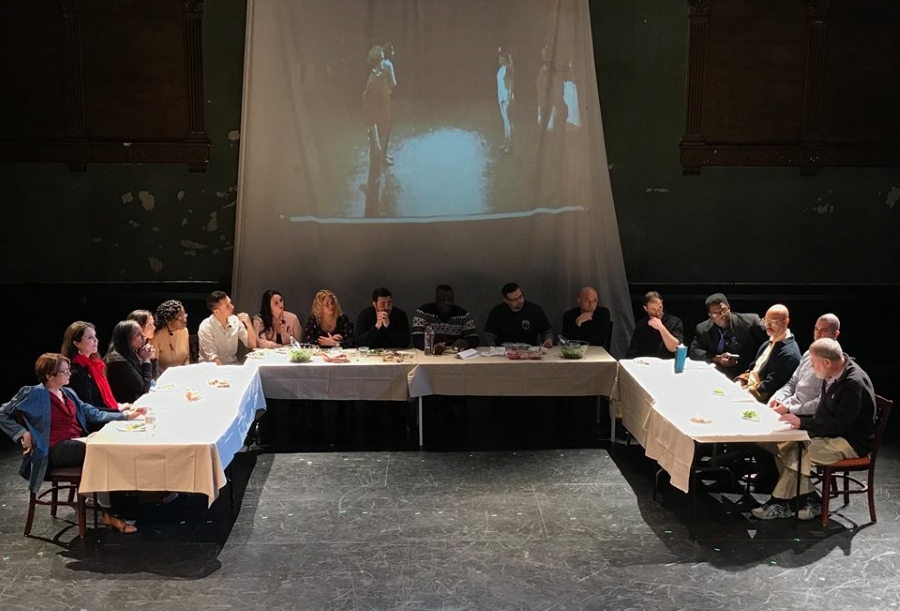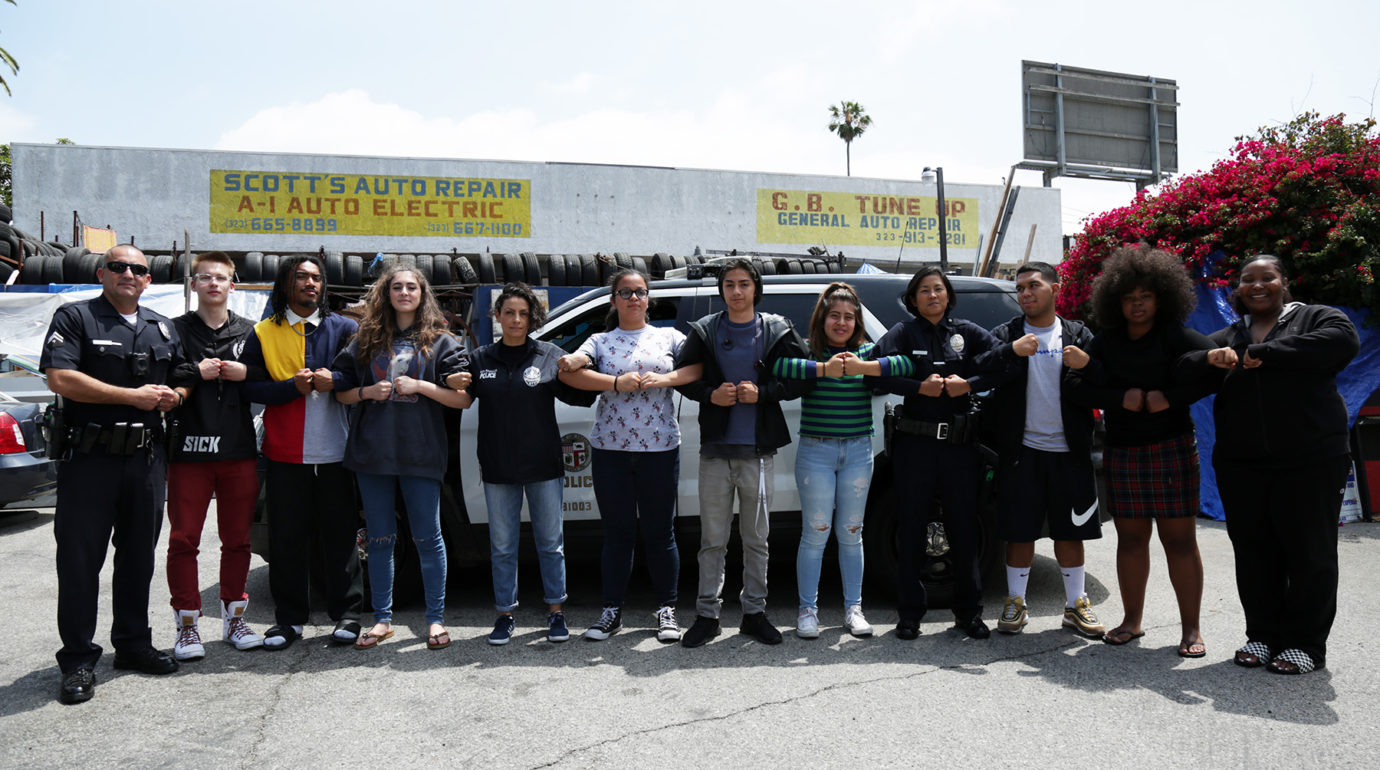In 2014, the harrowing footage of Eric Garner’s arrest, and the NYPD officer’s chokehold that led to his death, was everywhere. After the initial shock of the incident, Terry Greiss, artistic director of Brooklyn’s Irondale Ensemble Project, started to look at the viral video as a piece of theatre. “There are so many signals, both verbal and nonverbal, that are being deliberately ignored or just being missed,” says Greiss. “When this happens onstage, it’s bad—and here, it led to tragedy.”
Shortly after, Greiss had a “harebrained idea” to write to the NYPD police commissioner about starting a program to help police officers and civilians better communicate with each other using theatre practices. “It is very clear to me that everything we are taught as actors could be useful in police and community relationships,” says Greiss. The police commissioner thought so too, and within a matter of days the To Protect, To Serve, and To Understand program was set into motion.
Now going into its eighth round, the TPSU program brings volunteer community members and police officers together for 10 weeks to break bread, converse, and play theatre games. Many of the civilians have had past issues with the law, and a number of the officers have civilian board complaints against them. The NYPD supports the program by paying the officers overtime for the 10-week workshops.
“How do you get people who don’t know each other, very likely don’t trust each other, or even more so, are afraid of each other, to begin to look at each other?” asks Greiss. The answer was, of course, food. For each workshop a community volunteer prepares a home-cooked meal for the participants to share, and that’s when the conversation—often around controversial news topics and current events—begins.
Dinner is followed by a few hours of singing and Viola Spolin-based theatre games, an anchor of Irondale’s education and engagement training. “What we get from these games is an intuitive approach to communication,” says Greiss. Whether it’s a rousing round of Zip Zap Zop or a mesmerizing mirror exercise, the games morph to take on new meaning and translate to the high-stakes situations officers experience, explains Greiss. “There are these external impediments to communication—there’s fear, ego, power imbalance, pressure of time, danger—all this stuff that prevents real communication from going on. So how do you learn to deal with all that when they aren’t understanding?” The answer lies in acting techniques: Change your objective and choose what action to play next.
Another important component of the program is having the civilians and cops interview one another, then perform the other person’s story, Anna Deavere Smith-style. In the latest round of TPSU, a reticent civilian shared a traumatic story of the time she was sexually assaulted by a group of New York police officers. A cop carefully shared her story, embodying her movements and adapting her intonation, creating one of the most powerful exchanges in the program’s history. “It was like the world moved—it changed,” recalls Greiss.
The dinner conversations, theatre games, and powerful workshop moments all come together as a “stew pot” of sorts for a culminating public performance, and each presentation is followed by a talkback with the audience.

With a similar ethos to TPSU, the Walking the Beat arts education program encourages discourse between civilians and police officers. But it’s more preventative than corrective: The civilian participants are high schoolers. Over a 10-week period, students connect with cops of all ages through applied theatre games, Theatre of the Oppressed techniques, and improvisational storytelling.
For founder Theo Perkins, it was the groundswell of police brutality across the country, particularly in his hometown of Elizabeth, N.J., that inspired him to create the New Jersey-based program. “As an artist, I just had to ask: What can I do? How can I use my skill set to chip away at the community that formed me?” says Perkins.
This summer, the four-year-old program has gone bicoastal. “It has always been our goal to take this curriculum model across the countries,” says Perkins. An offshoot of the program is currently in residence at the Fountain Theatre in Los Angeles, where the participants are gearing up for a show Aug. 9-10. Back in New Jersey, a cohort of civilians and officers are preparing for a performance Sept. 14-15.
“It may sound simple to bring people together in a room—it’s not easy, but it is important,” says Perkins. It took a year of planning with the Los Angeles Police Department to get the program at Fountain Theatre ready. Students were incentivized with pay; it’s like a part-time summer job, funded by the city, and they also earn class credit.
“There’s a component where we are generating material and going through those applied and devised theatre exercises to create work, but there is also space for a conversation,” explains Angela Kariotis, the program’s curriculum director and facilitator. “We’re talking about implicit bias, our identities, how we present, the implications of how we present, and the larger systems in which we all operate within.”
The program presents some heady topics for high schoolers, but, Kariotis says, “There is also a lot of joy—incredible, palpable joy in the creative space. We’re pushing people to their imagination’s edge and to use creativity to solve problems.”
Kariotis recalls a powerful exchange that occurred when some of the cops took issue with a scene the teens created about the hashtags that spur social media storms when a person is killed by the police. It led to a discussion about official policy, police protection, and de-escalation tactics. And it reminded everyone that there are two sides to every story.
Both TPSU and Walking the Beat are working to build trust and make space for multiple perspectives and opinions. “We may never find agreement, and that’s okay—as long as we understand each other,” says Greiss.
So how is the “understanding” measured? The participants of Walking the Beat have entrance and exit surveys, in addition to a post-show talkback. For TPSU, the participants reconvene a month after the show to discuss how their 10 weeks together may have changed how they approach their work and life differently. Change often happens in secret, Greiss notes. “It doesn’t always happen at the moment you think you are catalyzing it.”
Irondale has also created a podcast for TPSU alumni to continue the conversations after the 10-week program. A documentary film showcasing the program is also in the works. Like Walking the Beat, Greiss hopes to scale up the program and implement it in other cities by codifying the TPSU workshop techniques and instituting a certification process for facilitators.
There’s a residual effect of introducing police officers to theatre: “It opens the door for them to get bitten by the stage bug,” says Perkins with a laugh. Indeed one officer who participated in the New Jersey program has gone on to pursue a career in theatre. And Greiss says he was contacted by casting director Bonnie Timmerman, who was looking to cast police officers, and one TPSU alum won a part in a TV show.
Greiss is heartened by the number of police officers and community members that return to Irondale to attend TPSU performances and the company’s other programming. “Sometimes the participants leave really wounded, but they come back,” says Greiss. “And that, to me, is one of the greatest acts of bravery.”


